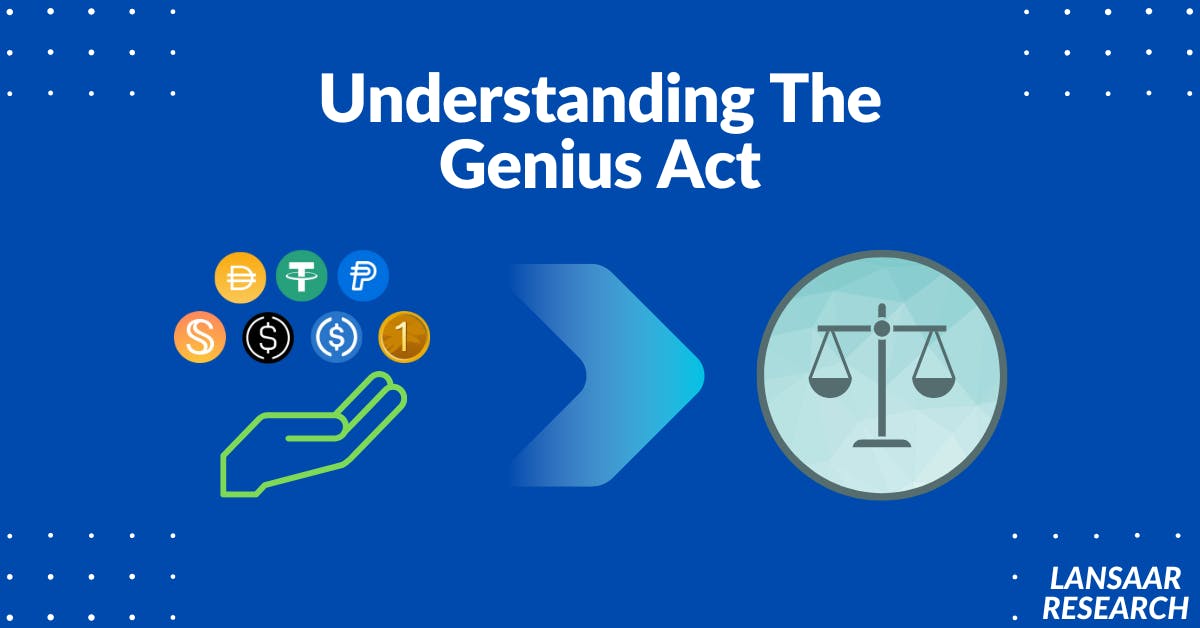Understanding The Genius Act
Every so often, payments infrastructure shifts just enough that entirely new companies, like PayPal, Venmo, and Stripe, emerge and define the next era of commerce.
The GENIUS Act (signed into law in July 2025) could signal such a shift. It’s the first real federal framework that describes how a company can issue digital dollars legally, who regulates them, and how they connect to existing rails.
What Is The GENIUS ACT?
The Genius Act is an American law passed on July 18th, 2025, to create clear national rules for stablecoins. GENIUS stands for “Guiding and Establishing National Innovation for US Stablecoins.” The GENIUS Act clarifies who can issue stablecoins, how they must be backed, and how consumers are protected. Its main goal is the make stablecoins transparent, safe, and integrated into the larger financial system.
The law states that Stablecoins can be issued by banks or licensed non-bank institutions. Every stablecoin must be fully backed by real assets such as US dollars. Issuers are required to publish regular reports specifying what backs their tokens. If a stablecoin company goes bankrupt, user funds take priority overall other claims to the company - thus ensuring consumer protection. Issuing companies can’t mislead people by implying government backing or deposit insurance.
The issuing companies must also comply with anti-money laundering rules and sanctions rules. The law encourages collaboration and coordination between federal and state regulators to create a unified national framework.
The Difference for Founders
- Stablecoins are officially payment instruments, not securities. This means you can generally build products with dollar-backed tokens without wandering into the domain of SEC rules. Banks, credit unions, and federally licensed fintech firms can issue stablecoins under clear supervision.
- National license path for nonbanks: Nonbank startups generally prefer clear federal rules to a 50-state patchwork. GENIUS gives you a federal charter if you meet reserve and disclosure rules. This drastically lowers compliance burden for nonbank startups.
- Transparency and trust are table stakes: Reserves must be 100% liquid (cash and short-term Treasuries), with monthly public attestations. That turns the consumer-facing pitch from “trust us” into “read the disclosure.” For founders, this helps provide credibility.
- Interoperability is the opportunity: GENIUS doesn’t prescribe how stablecoins plug into existing systems. Banks, FedNow, and Real Time Payments are now in scope. Founders are rushing to connect these dots: token flows, account flows, instant rails, while also ensuring adoption.
- Cross-border is in play: Treasury will approve “comparable” foreign issuers. If you’re thinking about remittances, FX, or global e-commerce, this clause provides the confidence to build corridors that used to take years of correspondent-banking negotiations.
What to Build
Let’s look at how the companies I mentioned previously, PayPal, Venmo, and Stripe, took unusual - but in retrospect, sensible - paths:
- PayPal turned “card in an email” into escrow for eBay.
- Venmo turned “splitting dinner” into a social feed.
- Stripe turned “card acceptance” into an API call.
The GENIUS Act sets up the foundation for the next wave of innovators. What is feasible depends on consumer behavior as much as the regulatory and technology landscape. However, there are some clear areas for innovation:
- Instant payroll for gig workers and SMBs.
- Programmable escrow for supply chains and B2B marketplaces.
- Refunds and payouts that hit consumer wallets in seconds.
- Cross-border stable rails for platforms operating across regions.
The key is programmability. With legally recognized digital dollars, you can tie payment triggers to real-world events, such as a delivery confirmed, service rendered, or proof-of-stake validated, without waiting for batch settlement or third-party escrow.
Risks and Context
- Regulatory follow-through: Though the GENIUS Act has been passed, agencies still need to publish the playbook: license manuals, exam procedures, and disclosure formats. Though founders should build now to be market-ready, they also need to be ready for iteration as the playbook emerges.
- AML/KYC: The GENIUS Act puts stablecoins under the Bank Secrecy Act. Founders must design compliance that scales with AML/KYC requirements without hindering the user experience.
- Vendor lock-in: The market will be tempted by one or two “winner” issuers. However, the ideal world for consumers and ambitious founders is a multi-rail, multi-wallet design, so that the ecosystem is not captive if rules or partners change.
Why This Matters Beyond Startups
Stablecoins regulated under the GENIUS Act are programmable dollars. This matters beyond startups - it can have geopolitical implications.
- For the U.S. dollar, it strengthens global adoption. Offshore markets will prefer transparent, U.S.-rulebook stablecoins over opaque alternatives.
- For small businesses, it can boost working capital. Money that settles instantly is money that can be redeployed sooner.
- For the economy, it’s a potentially powerful stimulus: reduced friction in payments equals more velocity, more participation, and more trust. However, this depends on the uptake of new solutions by existing platforms and by consumers.
The GENIUS Act is a significant law that provides startups, and particularly fintech firms, with a clear framework and protections that can spur innovation. Consumers should expect to see fintech and payments innovations in the coming years. Investors should expect to see the emergence of new unicorns in this space.
__


